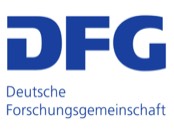New DFG research group FOR 5628 with our participation

During the development of a tumour, the tissue changes its shape, e.g., alternating between hard and fluidic states. For this, cells exert forces and are simultaneously influenced by forces. This research group is investigating which mechanical-physical processes are behind this. How do tumours and metastases develop? What makes them resistant to therapy? The team is investigating these questions using magnetic resonance elastography (MRE) – a new clinical procedure that can be used to record the mechanical properties of body tissue. The goal is to be able to better diagnose tumours.
Dr. Karl Hillebrandt and Prof. Dr. Igor Sauer are part of the research group as PI in three projects:
- A03 Cancer cell unjamming and jamming as prerequisites for the formation of primary and metastatic tumors
- B03 Scaffold composition and fluid pressure in recellularized hepatic and pancreatic tumors
- C01 Multiscale mechanical properties of tumors and tumor environment – from tissue specimens to patients
Was are happy to be part of this exzellent team!

